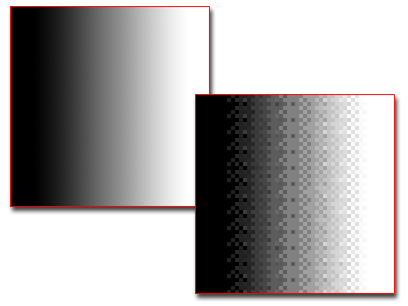When converting an image with a palette of a greater number of colors to an image with a palette of fewer colors, dithering is a means of simulating colors not in the more limited palette, by mixing different-colored pixels together.

Square on the right shows dithering.
Dithering is also a method of smoothing the edges between two color regions by mixing their pixels so the edges appear to blend together.
If you are rendering for the limited colors of an 8-bit display (256 colors), you have the option of turning on dithering. Dithering can help prevent a banding effect in color gradients. Dithering does increase the size of 8-bit files and can slow the playback speed of animations. You might want to try applying maps to the flat areas in the scene to see if that eliminates banding before you turn on dithering.
By default, 3ds Max renders 64-bit color output. Consequently, you also have the option of setting dithering for truecolor (24 or 32-bit color). The Dither True Color option ensures that you get the best quality on truecolor displays.
You turn dithering on and off in the Rendering panel of the Preferences dialog. You can also set dithering for scene motion blur in Video Post. Here, dithering provides a smoothing effect between the separate images making up the "blur." Video Post dither is set as a percentage of total dither in the Add Scene Event dialog.